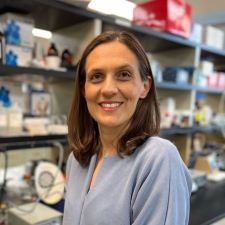Neuroblastoma is a rare pediatric cancer that typically arises in the adrenal glands, located above the kidney. Children with high-risk neuroblastoma often have poor prognoses despite intense treatment-including maintenance treatment with retinoic acid-underscoring the need for new treatments to improve long-term outcomes. Retinoic acid, which is orally available and generally well tolerated, helps neuroblastoma cells mature (differentiate) into normal cells; however, this process is entirely reversible once the retinoic acid is withdrawn. If this differentiating effect could be made permanent with the addition of a second drug, a combination treatment with retinoic acid could become a novel method of preventing patient relapse. After testing a panel of 452 small molecule drugs, Dr. Weichert-Leahey discovered that a drug called PF-9363 accentuated the effects of retinoic acid in neuroblastoma the most. She will now study how PF-9363 functions, alone and together with retinoic acid, both in cells and patient-derived neuroblastoma models in mice. These experiments will indicate whether combinations of this new compound with retinoic acid may improve outcomes for children with high-risk neuroblastoma.
Damon Runyon Researchers
Meet Our Scientists
Nina Weichert-Leahey, MD
Project title: "Elucidating the role of KAT6A and KAT6B in the epigenetic reprogramming of neuroblastoma to enforce neuronal differentiation"
Institution: Dana-Farber Cancer Institute
Award Program: Physician-Scientist
Sponsor(s) / Mentor(s): A. Thomas Look, MD
Cancer Type: All Cancers
Research Area: Epigenetics







